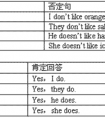按要求改写句子。1. You are at home now. (改为否定句)__________________________________________________________________2. He is going to visit the farm next Fr-六年级英语
题文
| 按要求改写句子。 |
| 1. You are at home now. (改为否定句) __________________________________________________________________ 2. He is going to visit the farm next Friday. (改为否定句) __________________________________________________________________ 3. The boy in black likes music. (改为否定句) __________________________________________________________________ 4. She doesn't usually go to work on foot. (改为肯定句) __________________________________________________________________ 5. You won't get fatter. (改为肯定句) __________________________________________________________________ 6. He didn't come home on time. (改为肯定句) __________________________________________________________________ |
答案
| 1. You aren't at home now. 2. He isn't going to visit the farm next Friday. 3. The boy in black doesn't like music. 4. She usually goes to work on foot. 5. You will get fatter. 6. He came home on time. |
据专家权威分析,试题“按要求改写句子。1. You are at home now. (改为否定句)______..”主要考查你对 否定句,肯定句 等考点的理解。关于这些考点的“档案”如下:
否定句肯定句
考点名称:否定句
- 否定句:
表示否定的句子。必须有否定词。
否定句的构成形式:
a. 谓语为be动词时,“be+not "一名学生。
b. 谓语为实义动词而且没有情态动词和助动词时,“do/ does/ did+not"构成否定。
例:I do not like dancing. 我不喜欢跳舞。
He does not want to go to school. 他不想去上学。
c. 谓语为“情态动词+实义动词”时,“情态动词+not”构成否定。
例:You must not smoke. 你千万不要吸烟。
I can not catch it. 我抓不住它。 - 否定句在英语语法中可以分为九类:
(1)一般否定句
I don't know this. No news is good news.
There is no person(smoking)/not a person/not any person(smoking)in the house.
(2)特指否定
He went to his office, not to see him.
I am sorry for not coming on time.
I don't think/believe/suppose/feel/imagine you are right.
(3)部分否定
All the answers are not right
All is not gold that glitters
I don't know all of them.
I can't see everybody/everything.
Both of them are not right.
(4)全体否定
None of my friends smoke.
I can see nothing/nobody.
Neither of them is right.
Nothing can be so simple as this.
(5)延续否定
You didn't see him, neither/nor did I.
You don't know, I don't know either.
He doesn't know English, let alone/to say nothing of/not to speak of(更不用说)French.
(6)半否定句
We seldom/hardly/scarcely/barely hear such fine singing.
I know little English. I saw few people.
(7)双重否定
You can't make something out of nothing.
What's done cannot be undone.
There is no sweet without sweat.
No gain without pains.
I can't help /keep/ laughing whenever I hear it.
No man is so old but(that)he can learn.
(8)排除否定
Everyone is ready except you.
He did nothing but play.
But for your help, I couldn't do it.
(9)加强否定
I won't do it at all.
I can't see it any more.
He is no longer a boy. 否定转移的形式与用法:
一、动词的否定转移
1.形式上否定主句的谓语,实际上是否定从句的谓语
当动词“think”、“believe”、“suppose”、“imagine”、“expect”、“feel”的主语是第一人称,谓语动词为没有任何副词修饰的一般现在时,它们的否定式实际上是对宾语从句的否定。
表示说话者提出一种委婉的看法或主张。如:
I think that he will help us.——I don’t think that he will help us. 我认为它不会帮助我们。
I believe that he is right.——I don’t believe that he is right. 我认为他不对。
I suppose that he likes it.——I don’t suppose that he likes it. 我想他不喜欢它。
2. 形式上否定谓语动词,实际上否定复合宾语
当动词“think”、“believe”、“suppose”、“imagine”、“expect”、“feel”、“find”的主语是第一人称,谓语动词为没有任何副词修饰的一般现在时,它们前面的否定式实际上是对复合宾语的否定。表示说话者所提出的一种委婉的看法或主张。如:
I think math difficult. — I don’t think math difficult. 我认为数学不难。
I find the story interesting. — I don’t find the story interesting. 我认为这个故事没有趣。
I expect so. —I don’t expect so. 我认为不会。
二、动词“think”、“believe”、“suppose”、“imagine”、“expect”、“feel”在下列情况下,否定不转移:
1.这些动词跟其他另一个动词一起做并列谓语时,否定不转移。如:
I believe and hope he won’t do that. 我相信并且也希望他将不会那样做。
I feel and admit that we are not foolish. 我觉得并且也承认我们并不愚蠢。
2.用于疑问句时,否定不转移。如:
Do you think it is not going to rain? 你认为天不会下雨吗?
Don’t you believe that he has done a good thing? 难道你不相信他做了一件好事?
3.用作插入语时,否定不转移。如:
Li Lei, I think, won’t be angry with you. 我想李蕾不会生你的气。
Tom, I suppose, won’t be against it. 我猜想汤姆不会反对。
Mike, I believe, hasn’t seen the film. 我认为迈克没有看这场电影。
4.动词前有其他副词修饰时,否定不转移。如:
I really don’t think it’s necessary for us to go there now. 我的确不认为我们有必要去那儿。
I feel strongly that he shouldn’t do such a thing. 我强烈地认为他不应该做那样的事。
5.动词为非一般现在时或主语不是第一人称时,否定不转移。
I thought that he wouldn’t come back soon. 我原以为他不会回来得这么快。
She didn’t believe that he became a good boy. 她不相信它变成了一个好孩子。
He thinks that he isn’t fit for the job. 他认为他不适合这件工作。
He doesn’t believe that what we told him is true. 他不相信我们告诉他的事是真的。
6.当宾语从句中含的否定为“not……at all”、“not a little”、“not a few”、“not enough”、“can’t help”等固定搭配时,否定不转移。如:
I think that he doesn’t know it at all. 我想他对那一点也不知道。
I suppose that it is not enough to remember the words if you want to learn the language well. 我认为如果你想把这门语言学好,那么只记单词是不够的。
I believe that you can’t help singing our national anthem when you win the first place in the Olympic Games. 我相信当你在奥运会上获得第一名时你会情不自禁地唱起国歌来。
7.当宾语从句中含“no”、“nothing”、“nobody”、“nowhere”、“hardly”、“seldom”、“little”、“few”等否定词或半否词时,否定不转移。如:
I believe that nothing can make me give it up. 我想任何事情也不能使我放弃。
I think that no one can escape if the ship sinks in the sea. 我认为如果这艘船沉入海底的话,那么谁也逃不掉。
- 最新内容
- 相关内容
- 网友推荐
- 图文推荐
| [家长教育] 孩子为什么会和父母感情疏离? (2019-07-14) |
| [教师分享] 给远方姐姐的一封信 (2018-11-07) |
| [教师分享] 伸缩门 (2018-11-07) |
| [教师分享] 回家乡 (2018-11-07) |
| [教师分享] 是风味也是人间 (2018-11-07) |
| [教师分享] 一句格言的启示 (2018-11-07) |
| [教师分享] 无规矩不成方圆 (2018-11-07) |
| [教师分享] 第十届全国教育名家论坛有感(二) (2018-11-07) |
| [教师分享] 贪玩的小狗 (2018-11-07) |
| [教师分享] 未命名文章 (2018-11-07) |

![They ___________ like sweet things. [ ]A. don't B. aren't C. isn't-五年级英语](http://www.00-edu.com/d/file/ks/4/1/63/2019-08-31/small9cd523a0de82eff49e4ea07f34ddaa2f1567192691.gif)


![That's ___________jeep. It's a car.[ ]A. a not B. not C. not a D. not an-六年级英语](http://www.00-edu.com/d/file/ks/4/1/63/2019-08-31/small906a4f337e361f331d9a3de0dac7f65e1567192681.gif)

